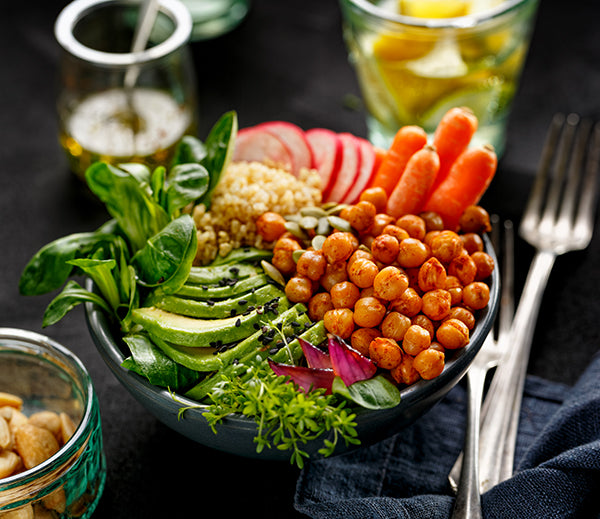Menu

The Vegetarian Diet & Protein Needs
The Vegetarian Diet
In recent decades, vegetarianism has shed its image as an offbeat lifestyle choice and attracted many Americans who want to take advantage of the benefits offered by plant-based eating. These people are adopting a vegetarian diet to improve their health, avoid the chemicals used in animal foods, reduce food costs, conserve natural resources, adhere to religious disciplines, and respect animal life. More than 7 million Americans now eat a vegetarian diet for these reasons and others.
For many individuals new to the vegetarian way of life, getting enough protein has proven difficult. Let’s break it down…
Protein; what is it, what does it do and how do I get it enough?

There is no question that protein is an essential nutrient. It helps to build, maintain, and repair just about every part of the body. It makes up our hair, fingernails and toenails, muscles, cartilage, and tendons, along with many hormones, antibodies, and enzymes.
- proteins are long-chain molecules made up of amino acids.
- There are approximately 22 of them in the protein we use.
- There are eight amino acids that the adult body cannot manufacture: valine, leucine, isoleucine, lysine, threonine, tryptophan, methionine, and phenylalanine.
Because protein is so critical, we must ensure that we consume sufficient quantities. Otherwise, the body will break down more molecules than it can build up, resulting in overall deterioration. Pregnant women must be especially careful to avoid such a situation, as it will affect both their health and their unborn babies' as well. Below is a daily protein chart.
How Much Protein Do I Need as a Vegetarian?
The World Health Organization (WHO) and Food and Agriculture Organization (FAO) recently published a technical report on protein and amino acid requirements. This analysis finds that the safe level of protein intake for adults is 0.83 grams per kilogram (kg) of body weight per day -a level that "would be expected to meet the requirements of most (97.5%) of the healthy adult population." The safe levels of protein intake per kg of body weight are higher for children, while women who are pregnant or lactating require extra protein as well.
A similar recommendation for protein intake in adults - 0.8 grams of good-quality protein per kg of body weight -comes from the Institute of Medicine, part of the National Academy of Sciences. 5 By this method, you multiply your body weight in pounds by 0.453 (to convert to kilograms), then multiply by 0.8. If you weigh 155 pounds, for example, you multiply that figure by 0.453, which is 70.2 kg, then multiply by 0.8 grams per kg to arrive at 56 grams of protein per day.
The Institute of Medicine's 2005 recommended dietary allowances (RDAs) for protein are as follows :
Infants
|
7-12 months |
1.2 g/kg/d or 11 g/d |
Children (boys and girls)
|
1-3 years |
1.05 g/kg/d or 13 g/d |
|
4-8 years |
0.95 g/kg/d or 19 g/d |
|
9-13 years |
0.95 g/kg/d or 34 g/d |
Adolescents
|
Boys, 14-18 years |
0.85 g/kg/d or 52 g/d |
|
Girls, 14-18 years |
0.85 g/kg/d or 46 g/d |
Adults
|
Men, 19 years and older |
0.80 g/kg/d or 56 g/d |
|
Women, 19 years and older |
0.80 g/kg/d or 46 g/d |
.. “All of GarysVitamingCloset.com supplements are rich in natural, raw plant-based protein all from nature's superfoods.”
- Choosing a selection results in a full page refresh.


